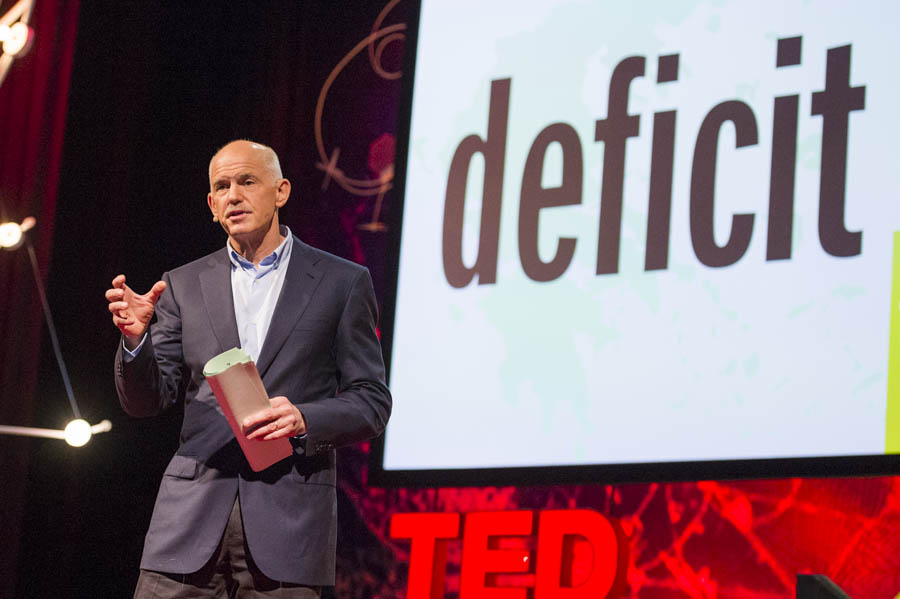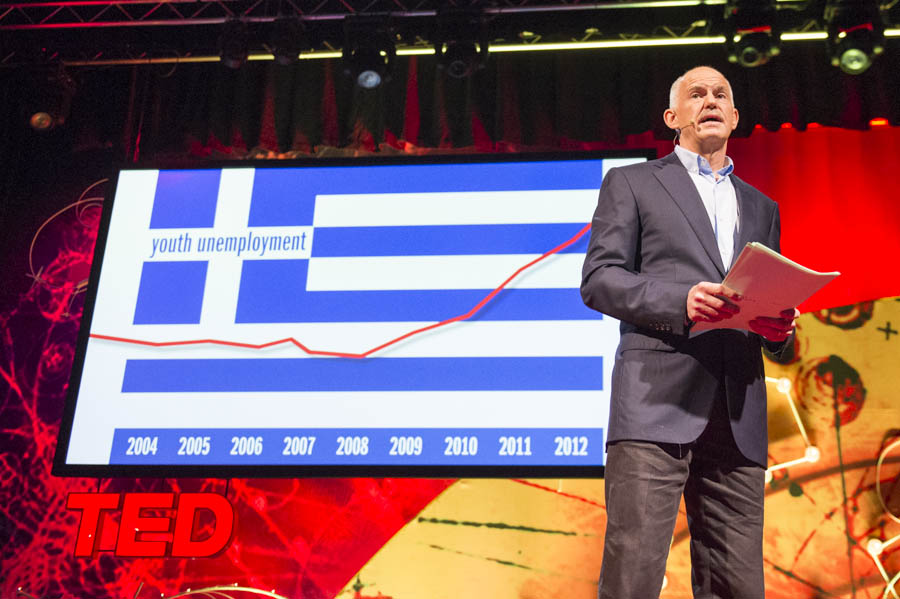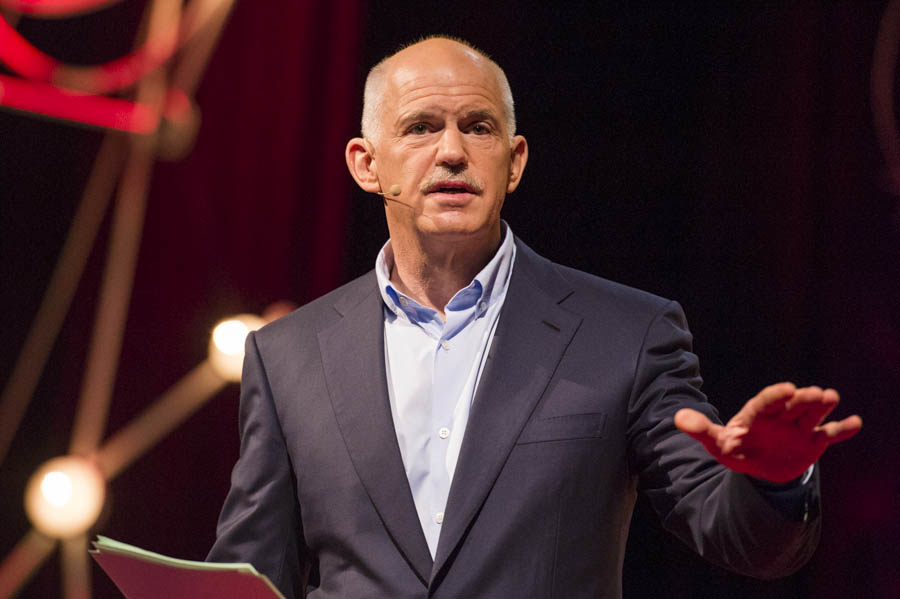The former Prime Minister of Greece, George Papandreou, takes the stage as the first speaker at TEDGlobal 2013. It’s already been a long morning, with a few dozen protesters earlier objecting to his presence in Edinburgh outside the conference center. And Papandreou cuts something of a pensive figure as he tells us he’s set to give a speech unlike any he’s ever given before. He’s here, he tells us, to talk about the failure of leadership in global politics and our globalized economy, and to try to explain where things have gone wrong with democracy since its birth in ancient Greece.
First, a personal story of Papandreou as a 14-year-old boy. He grew up in a distinctly political family (both his father, Andreas, and grandfather, Georgios, were also the country’s Prime Minister), and he recalls how he would sneak downstairs to listen to his parents and their friends debating heatedly about the issues of the day.
But in 1967, with elections looming, unrest got personal, when soldiers burst into the Papandreou home, found young George and threatened to kill him before his father revealed himself and was arrested. For most of us, such an experience is unimaginable. For Papandreou, there was a weightier impact. “We survived, but democracy did not. Seven brutal years of a dictatorship, which we spent in exile.” Today, he says, democracy is again facing a moment of truth.
This time, that moment is being driven not by the military but by the markets. Greece, of course, has been the poster child for economic troubles in the Eurozone. [Last week, Bloomberg reported that the nation’s economy contracted for the 19th straight quarter in the first three months of 2013.] Papandreou tells a tale of being in Brussels in April 2010, right after he had been elected Prime Minister. Conversations on Eurozone economic policy stretched on until, at 1:50 am one morning, one of his European counterparts snapped, “Quick, we only have ten minutes.” Why? asked Papandreou. Another leader answered: “In ten minutes the markets are opening in Japan. And there will be havoc in the global economy if we haven’t got an agreement.” So they quickly came to a decision, Papandreou says; the audience murmurs at the anecdote. After all, we know what happened to the Greeks in the ensuing years as policies based on the dreaded “a” word, “austerity,” imposed cuts and hardships on those that Papandreou acknowledges were “in the main not to blame for the crisis.”
The real problem, Papandreou argues, is bigger than one country, and he says Greece was just a preview of what might still be to come. “Our democracies are trapped by systems that are too big to fail, or more accurately, too big to control.” As Papandreou has it, Europe’s leaders have learned nothing, and they remain led by their fears and blind faith in what he describes as “the orthodoxy of austerity.”
“Instead of reaching out to the collective wisdom in our societies, investing in it to find more creative solutions, we have reverted to political posturing,” he says. That posturing includes treating Greece as a whipping boy for collective failure. “Those profligate, idle, ouzo-swilling, Zorba-dancing Greeks,” mimics Papandreou. “They are the problem! Punish them!”
Until Europe’s political leaders acknowledge the deeper patterns at play, the continent is doomed to face both more of the same, perhaps more of worse. “It’s no wonder many political leaders, and I don’t exclude myself, have lost the trust of our people,” says Papandreou. “When riot police have to protect parliaments, a scene that is increasingly common around the world, there is something wrong with our democracies.”
So while we may think we have weathered the storm in Europe, we remain challenged. Describing a 60% youth unemployment rate as a “lack of imagination, if not a lack of compassion” (as the Telegraph reported recently, certain parts of Greece “boast” the highest level of youth unemployment in the European Union, at 72.5%). Papandreou wants to make the case that the problem is less economic than democratic: “Let’s throw democracy at the problem,” he suggests. A brief digression into linguistics — the word “idiot,” he suggests, originally meant someone self-centered, someone with no interest in public affairs. But how to build a forum that allows citizens to participate in public affairs that stretch far across mere geographical borders?
He closes with a call to re-imagine the European Union as a genuine democracy beyond borders, where citizens can vote directly for a European president, can deliberate on controversial issues, are empowered to vote on future treaties — and where young people are free to study where they choose. A Europe where citizens are not “German” or “Swedish” or “Greek,” but are “Europeans,” where the common identity is democracy.
“Some might accuse me of being naive, of putting my faith in the power and wisdom of people,” says Papandreou, acknowledging the silent response that this is hardly a new idea, and it’s never seemed one likely to become a reality. “After decades in politics, I am also a pragmatist.” Things must change, he says, and the change must come from people, not politicians. “From everyone who stands up to injustice and inequality. Everyone who stands up to those who preach racism rather than empathy, dogma rather than critical thinking, technocracy rather than democracy. Everyone who stands up to the unchecked power, whether it is authoritarian leaders, plutocrats hiding their assets in tax havens, or powerful lobbies protecting the powerful few.”
“It is in their interest that all of us are idiots,” he concludes. “Let’s not be.”
***
TEDGlobal director Bruno Giussani has some questions for Papandreou, asking him first to describe how he felt when he made that early-morning decision in Brussels. Lightly edited versions of his responses follow:
GEORGE PAPANDREOU: Obviously there were constraints which didn’t allow me or others to make the decisions we wanted. I had hoped we would have time to deal with the deficit, not cut it, which was a symptom of the problem. That hurt, it hurt the younger generation, the people who are demonstrating outside, and who were at the [TED opening party at the] National Museum last night… We’re closing in on ourselves in politics, and we need to change that, to find new participatory ways, to find great capabilities in technology, to use the minds we have, to find solutions which are much better. We have to be open. Politicians because of the crisis have closed themselves into boxes, and that’s very hurtful for democracy.
BRUNO GIUSSANI: In your talk, you call for more Europe. That runs counter to many of the arguments currently underway, which actually argue for less cooperation or for closing borders. How do you reconcile these tensions?
GP: One of the worst things in the crisis was starting the blame game. “You’re to blame, they’re to blame.” The fundamental idea of Europe is that we can cooperate beyond borders, with different traditions, nations, histories, we can go beyond conflicts and work together. The paradox is that because we have this blame game we have less potential to convince citizens we should work together, when now is the time to bring powers together. More Europe for me is not about giving more power to Brussels but to the citizens of Europe. Really making Europe a project of the people–that would be the way to answer some of the fears in society and liberate the potential European citizens have.
BG: We sent a team to ask some of the protesters outside if they had any questions for you. Here’s Willie Black, who asks why you think you have any answers when so far your answers have failed.
GP: Our politics are limited to our borders, our national borders, that’s what our democracies are. The financial crisis was not an internal problem in Greece. Yes, we had problems and we have to change, but it was a global problem. There were pressures from Japan and so on. We have to see how we work together on these issues…
People today are disappointed with politics, and angry with politicians. There’s a reason why. We do have great potential in our societies, this is a time when there are so many ideas and possibilities, but we haven’t tapped into that potential. Politicians are much more impotent than we think, trapped by lobbies, by big interests. They make policies within countries. But we have to have a real democratic evolution or revolution if you like. We must bring in our citizens, create institutions, create a secure platform of values. There’s a basic bargain, if there is security to work, freedom of speech, citizens can actually innovate and bring up solutions, and that will give us the potential to make changes. We need a radical rethinking of politics in the globalized world to use the great power we have, which can enslave us and capture us but which can also be liberating if used in right way. It’s the basic idea of democracy from many years ago: to use power for the people.
George Papandreou’s talk is now available for viewing. Watch it here »



Comments (6)
Pingback: Illegitimate Greek Debt | The Debt Tribunal
Pingback: Η Ομιλία Του ΓΑΠ Στο TED Global | θοδωρής γεωργακόπουλος
Pingback: Protesting Papandreou: Anti-austerity demonstrators at TEDGlobal 2013 – www.reinform.nl